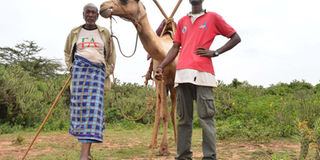OUT&ABOUT: The legendary camel rider

Arge Wambile, 76, with his son Lawrence Wambile, 31,at the Maralal International Camel Derby 2017 in Samburu County on September3, 2017. PHOTO|AYUB MUIYURO
What you need to know:
- This year, Lawrence’s father could not walk with them as age was catching up with him, this saw the entry of his 15 year old brother. Our father is now growing old and he can’t walk for long distances like before. He has to use a vehicle because he can’t miss the event.
- The old man says participating at the animal competition has not only brought monetary value but has also earned him a name. In 2011, we travelled to Botswana where we had been invited to train wild camels and it was a great experience.
- The competition helps reduce the tension between the various communities who take part in the race and at the same time, helps them appreciate the diverse cultures
On the momentous day for the annual Maralal International Camel Derby in Samburu County, we meet 31 year old Lawrence Wambile. Mr Wambile is in accompanied by his two brothers, his elderly father and eight camels that would take part in the race.
He and his father Mr Arge Wambile, aged 76, have been participating in the animal race since 1994. They are busy directing the grunting camels as they lead them to a grazing field ahead of the 10 kilometre race for professional riders. The journey to the event’s venue takes them eight days, walking with the camels prior to the event.
A CAMEL’S VALUE
This year, Lawrence’s father could not walk with them as age was catching up with him, this saw the entry of his 15 year old brother.
“Our father is now growing old and he can’t walk for long distances like before. He has to use a vehicle because he can’t miss the event,” said Mr Wambile.
Hundreds of participants troop to the county in Northern Kenya to take part in the event that was started in 1991.
To the Wambile family, camel keeping is their main economic activity with them keeping camels for various reasons; meat, milk and for riding.
“At the derby, we also hire out camels to participants for a fee. We get to sell some of our camels during the event, especially to international visitors,”
The old man says participating at the animal competition has not only brought monetary value but has also earned him a name.
“In 2011, we travelled to Botswana where we had been invited to train wild camels and it was a great experience,” he said.

Arge Wambile with his son Lawrence Wambile. PHOTO|AYUB MUIYURO
PROMOTING UNITY
Although he will no longer be active in the sport he says the training he has offered to his sons still makes him proud.
He has won the competition in the professionals’ category more than 10 times, a record that is yet to be broken since the launch of the derby.
Mr Wambile noted that apart from family gains, the Derby has helped promote peaceful co-existence among Northern Kenya pastoral communities who have been clashing for a long time due to limited resources.
“The competition helps reduce the tension between the various communities who take part in the race and at the same time, helps them appreciate the diverse cultures,” said Mr Wambile.
Some of the communities that have been taking part in the event for the past 23 years include the Samburu, Rendille, Turkana, Pokot and Somali; who mainly form the pastoral community.
This was confirmed by Samburu county Director of Tourism and Wildlife conservation Matthew Leakono.
“We had an incidence like the Baragoi Massacre which brought about a lot of tension but through such events, the communities come together for a common activity,” he said.





